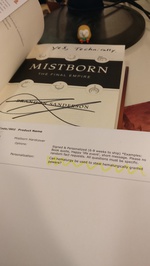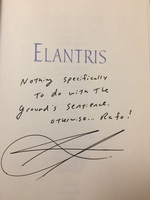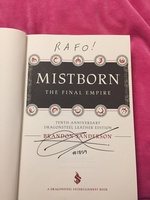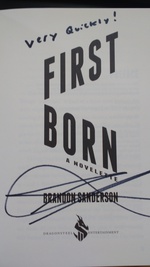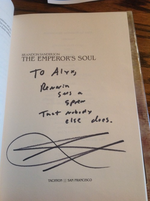Brandon Sanderson
Warning, Evgeni. I'm really considering doing a backpedal on savants. The more i think about them, the less I'm not liking how my current course has them being treated in upcoming books. I think it deviates too far from my original vision.
Argent
Hey, I wouldn't normally contact you directly like this, but given that you thought it important enough to reach out and let me know you might change how savants work, I figured you probably wouldn't be too upset by this message. I replied to your Facebook comment, asking if you could clarify a little bit which aspects of savantism you are thinking of keeping and/or cutting. I don't need an essay on the topic (though you know I'd love one!), just some details on what we can consider canon for theories, and what we should be careful around.
Brandon Sanderson
Evgeni,
So here's the problem. The more I dig into savants in the later outlines, the more I feel that I'm in a dangerous area--in that I'm disobeying their original intention. (Which is that using the power so much that it permeates your soul can be dangerous, a kind of uncontrolled version of a spren bond.)
And so, I don't want to let myself just start making people savants right and left. It needs to be a specific thing. Wax is the troubling one, as I have him burning so much steel that he's well on his way, but isn't showing any side effects. If I'm going to give him savant-like abilities, he needs savant-like consequences.
That's the danger, just falling back on savanthood to do some of the things I want, so often that it undermines the actual point and purpose of them in the cosmere lore.
So if I backpedal, it will be to contain this and point myself the right way, sharply curtailing my desire to make people savants without their savanthood being an intrinsic part of their story and conflict in life. (Like it was for Spook, and is for Soulcasting savants on Roshar.)
Feel free to share this.
Argent
Okay, so - if you do decide to go this route, I see the story implications (larger focus on consequences, less easy to get to the point where a character can be considered a savant). What I am not sure about is the potential for a mechanical change. Would a backpedal on your side cause a conflict with information you've shared with us, in or out of your books? Are you saying that it's possible that Wax won't be considered a savant (if you can't squeeze a good ramifications plot for him that doesn't contradict the apparent lack of consequences so far, for example)?
Brandon Sanderson
I haven't decided on anything yet. It's mostly consequences for the future--just a kind of, "be aware I'm not 100% pleased with how Wax turned out, re: savanthood and Allomantic resonance."
The idea of resonance is that two powers, combined, meld kind of into one single power. This is a manifestation of the way Shards combine. Wax was intended as a savant of the two melded powers. But without consequences in his plot, I'm not confident that I'll continue in the same vein for future books.

